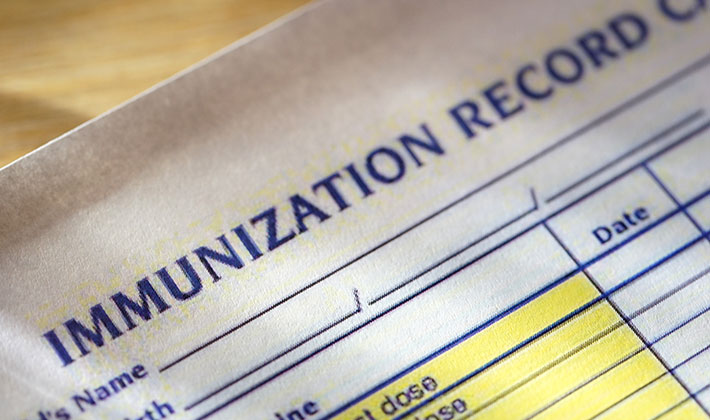
Childhood Vaccines
At 4-6 years of age, your child should receive vaccines to protect them from the following diseases:
- Diphtheria, tetanus, and whooping cough (pertussis) (DTaP) (5th dose)
- Polio (IPV) (4th dose)
- Measles, mumps, and rubella (MMR) (2nd dose)
- Chickenpox (Varicella) (2nd dose)
- Influenza (Flu) (every year)
Vaccines at 4 to 6 Years

What vaccines will my child get?
At 4-6 years of age, your child should receive vaccines to protect them from the following diseases:
- Diphtheria, tetanus, and whooping cough (pertussis) (DTaP) (5th dose)
- Polio (IPV) (4th dose)
- Measles, mumps, and rubella (MMR) (2nd dose)
- Chickenpox (Varicella) (2nd dose)
- Influenza (Flu) (every year)
After vaccinations
Sometimes children have mild reactions from vaccines, such as pain at the injection site, a rash, or a fever. These reactions are normal and will soon go away.
After your child gets a vaccination:
- Read the Vaccine Information Sheet(s) your healthcare professional gave you to learn about side effects your child may experience.
- Pay extra attention to your child for a few days. If you see something that concerns you, call your child’s doctor.
Treat mild reactions from vaccines:
- Use a cool, damp cloth to help reduce redness, soreness, and/or swelling at the injection site.
- Reduce fever with a cool sponge bath.
- Ask your child’s doctor if you can give your child a non-aspirin pain reliever.
Important developmental milestones
Get tips to prepare for your baby’s well-child visits.
By 4-6 years, most children:
- Speak very clearly
- Tell stories
- Can print some letters or numbers
- Hop and may be able to skip
- Enjoy playing
Well-child visits tracker
Record your baby’s vaccines, weight, height, and developmental milestones.
Vaccines before school
Your child will typically need a certificate of immunization to enroll in school. Your state may also require children entering school to be vaccinated against certain diseases, such as whooping cough (pertussis). If you’re unsure of your state’s school immunization requirements, check with your child’s doctor, your child’s school, or your state’s health department.
Your doctor’s office or healthcare clinic should be able to give you a record of your child’s immunizations. You can also ask if your doctor has recorded the vaccines your child has received in your state’s immunization registry.
Following the vaccine schedule
The Centers for Disease Control and Prevention, American Academy of Family Physicians, and American Academy of Pediatrics strongly recommend children receive all vaccines according to the recommended vaccine schedule.
- Get a list of vaccines that your child may need based on age, health conditions, and other factors.
- Learn the reasons you should follow the vaccine schedule.






































No hay comentarios:
Publicar un comentario